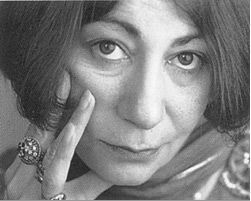Sara Suleri Goodyear, professor emeritus of English and author of Meatless Days, dies at 68
Best known for a groundbreaking memoir of life in post-colonial Pakistan, the English professor is remembered for her dramatic personality and a tendency to go against the grain.

Yale News
Sara Suleri Goodyear, proclaimed by many as the eminent Pakistani writer of her generation, died on Sunday, March 20. She was 68.
The professor emeritus of English joined Yale’s faculty in 1983 with a specialized focus in Romantic and Victorian poetry. Through several prominent texts that remain classroom classics, Suleri became well-established as a prominent scholar of postcolonial studies — though she resisted that label for its oversimplifications. Colleagues in the department remember Suleri as a dramatic personality and provocative scholar who spoke her mind and fearlessly confronted and criticized texts.
“Sara was never afraid to go against the grain: to speak what she believed was right, true, and important, about literature, politics, or life,” Murray Biggs, a semi-retired professor of english, theater and film, wrote in an email to the News. “Academics are apt to be cornered by intellectual or philosophical categories. But Sara was impossible to pigeon-hole.”
Suleri died in Bellingham, Wash. where she had been living with relatives after battling health issues for several decades. She is survived by two siblings as well as many nieces and nephews.
Born in Karachi, Pakistan, Suleri was the third of five children. Her family, whose history Suleri recounts in her widely acclaimed memoir “Meatless Days,” split time between the United Kingdom and Pakistan, moving frequently for her father Z. A. Suleri’s work as a prominent journalist and activist. Her Welsh mother, Mair Suleri, was an English professor at Punjab University in Lahore.
Suleri went on to study English literature at Kinnaird College, Punjab University and finally Indiana University, where she earned her Ph.D. After a brief stint at Williams College, Suleri came to Yale as a junior professor of Anglophone literature, teaching several seminars on British India. Suleri entered academia at a time when post-colonial studies trended increasingly towards anti-Enlightenment ideas, but she was known to hold an ironic tolerance for the writings of the British imperialists such as Rudyard Kipling and Edmund Burke.
Her charisma in the classroom was carefully controlled, colleagues recalled, and she spoke with a soft, even-keeled voice. Still, she inclined towards mischief: once, in front of a large lecture audience, she quietly tore a book to shreds to stunned applause.
“Throughout the decades she was a voice for surprising and disturbing truths,” English professor Leslie Brisman wrote to the News.
In 1989, Suleri published “Meatless Days,” a survey tying together tragic personal memories with the history of post-colonial Pakistan in nine semi-autobiographical tales. Her work blurred the line between fiction and non-fiction, and often compressed or re-arranged time periods.
“‘Meatless Days’ is an achievement so extraordinary that it often exceeds the capacity of reader, reviewers and critics to calibrate or categorize it,” proclaimed the book “South Asian Novelists in English: An A-to-Z Guide.” “Few South-Asian writers in English have produced as distinctive an idiom or density of thought and metaphor.”
In 1993, Suleri published “The Rhetoric of English India,” which is still a seminal text in postcolonial studies, as well as a wealth of scholarly articles. The same year, Suleri married retail company executive Austin Goodyear, who died in 2008. Suleri was a founding editor of the Yale Journal of Criticism and also served as an advisor to the Yale Review. Throughout her career, she was an ardent defender of free speech and held an affinity for the writings of Salman Rushdie.
Later in her career, Suleri faced a number of health issues that limited her teaching and research activities. Still, she remained connected to her colleagues and continued writing, most recently co-writing “A Tribute to Ghalib: Twenty-One Ghazals Reinterpreted,” a translation and commentary of 17th-century poetry.
“The choice has to be made between either saying ‘I cannot represent a culture’, or ‘Like it or not, I do,” Suleri said during an appearance on a 1993 documentary, cigarette in hand.
Suleri is expected to be buried in New Haven, with a memorial service held at a later date.







